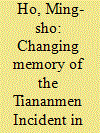|
|
|
Sort Order |
|
|
|
Items / Page
|
|
|
|
|
|
|
| Srl | Item |
| 1 |
ID:
184089


|
|
|
|
|
| Summary/Abstract |
This article examines the three-decade evolution of remembering the Tiananmen Incident in Taiwan by looking at annual commemorative activities. There is a decisive shift from a patriotic understanding to a cosmopolitan perspective grounded in universal values. The earlier memory was based on an ethnic nationalism that stressed consanguinity among Taiwanese and mainland Chinese and a narrative of the Chinese Republican Revolution. However, such framing lost its persuasiveness and the memory of Tiananmen faded as Taiwanese, particularly the younger generation, embraced an indigenous identity. China’s rapid economic growth and its ascendency as a new world power neutralized the potency of the earlier memory because it demonstrated the possibility of nationalistic aspirations without democracy. Since 2011, commemorative rallies have revived and proceeded with a newer understanding of the Tiananmen Incident in terms of human rights, civil society, and youth activism. This article argues that this ‘mnemonic change’ reflects Taiwan’s democratization and the indigenization of Taiwanese society, enabling young organizers to articulate their own Tiananmen memory by referencing global civil-society activism. Mnemonic change in Taiwan is examined with a comparative reference to the parallel development in Hong Kong.
|
|
|
|
|
|
|
|
|
|
|
|
|
|
|
|
| 2 |
ID:
141110


|
|
|
|
|
| Summary/Abstract |
The Nanjing Incident of late March 1976 was a precursor of, and according to some analysts a trigger for, the more famous Tiananmen Square demonstrations of 4–5 April. The two protests have widely been interpreted as spontaneous outpourings of dissent from Cultural Revolution radicalism, expressed through mourning for the recently deceased premier, Zhou Enlai. A closer look at the background to these demonstrations in Nanjing reveals that the protests there occurred in the midst of, and in response to, a vigorous public offensive by former leaders of rebel factions to overthrow civilian cadres for reversing Cultural Revolution policies. The outpouring of respect for Zhou – and criticism of Politburo radicals – mobilized enormous numbers of ordinary citizens onto the city streets, far larger numbers than the rebel leaders were able to muster. This demonstrated the disappearance of the popular support rebel leaders had briefly enjoyed a decade before. While the Nanjing protests were unanticipated by either the rebel leaders or the Party officials they sought to overthrow, they were only the latest in a series of local political confrontations.
|
|
|
|
|
|
|
|
|
|
|
|
|
|
|
|
| 3 |
ID:
170317


|
|
|
|
|
| Summary/Abstract |
In the context of wider misunderstanding of the roles of Hua Guofeng and Deng Xiaoping in the post-Mao "reversal of verdicts," conventional wisdom views Hua as an obstacle to the vindication of the 1976 Tiananmen protests, and the outcome as contributing to Deng's victory in an ongoing struggle between the two. In fact, the politics of the Tiananmen reversal were complicated and multilayered, and at clear variance from common assumptions concerning the two leaders. At the level of specific policy, there is no evidence of differences between Hua and Deng. But in terms of engagement, Hua was more proactive in pushing the process forward, albeit hoping that this could be done in a relatively quiet manner, while Deng showed little interest. When the crucial moment came during the 1978 Central Work Conference preceding the Third Plenum, Deng was overseas while Hua took decisive action to affirm that the protests were "completely revolutionary." Back in Beijing, Deng supported "the decision of the Party Center headed by Chairman Hua," a decision reflecting Hua's political approach from virtually the outset of his leadership. As both leaders sought to explain the decision, Deng's main concern was to temper the result, particularly by warning of "consequences" that could damage Mao's reputation if not handled carefully.
|
|
|
|
|
|
|
|
|
|
|
|
|
|
|
|
| 4 |
ID:
088602


|
|
|
|
|
|
|
|